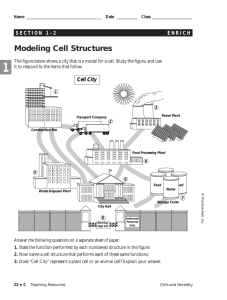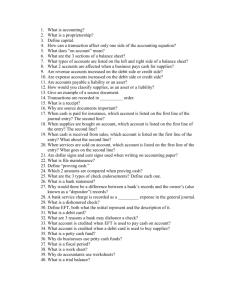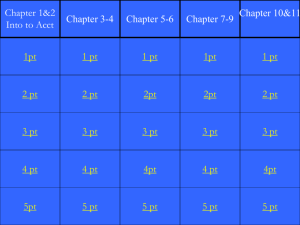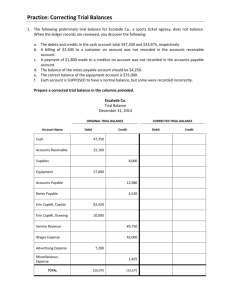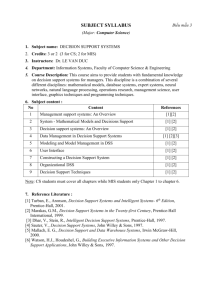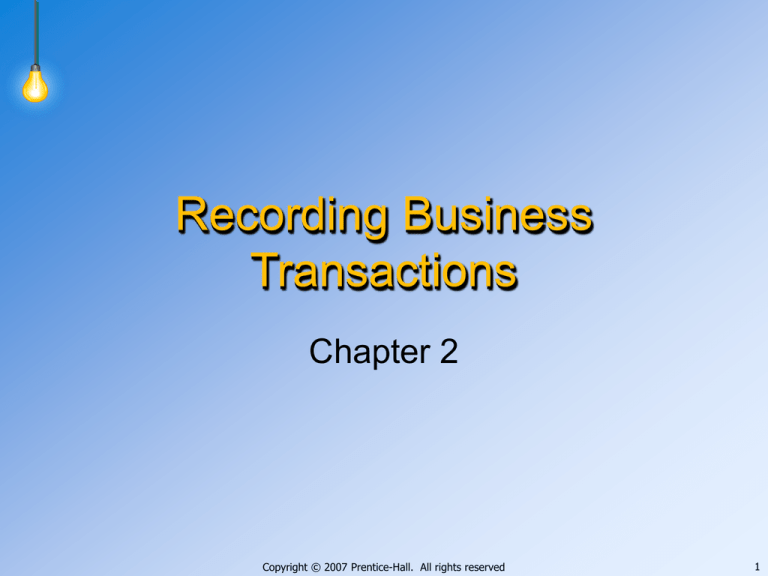
Recording Business
Transactions
Chapter 2
Copyright © 2007 Prentice-Hall. All rights reserved
1
Objective 1
Use accounting terms
Copyright © 2007 Prentice-Hall. All rights reserved
2
Account
• Basic summary device
• Detailed record of increases and
decreases in specific assets, liabilities, or
stockholders’ equity during a period
Copyright © 2007 Prentice-Hall. All rights reserved
4
Ledger
• Book or printout holding all the accounts
Copyright © 2007 Prentice-Hall. All rights reserved
5
Accounting Equation
Accounts are grouped in 3 broad categories:
Assets
=
Liabilities
Copyright © 2007 Prentice-Hall. All rights reserved
+
Equity
6
Assets
Economic resources that will benefit the business
in the future
• Cash
• Accounts Receivable
• Notes Receivable
• Prepaid Expenses
• Land
• Building
• Equipment, Furniture, Fixtures
Copyright © 2007 Prentice-Hall. All rights reserved
7
Liabilities
Creditors’ claims to assets (debt)
• Accounts Payable
• Notes Payable
• Accrued Liabilities
Copyright © 2007 Prentice-Hall. All rights reserved
8
Stockholders’ Equity
Owners’ claim to the assets
• Common Stock
• Retained Earnings
• Dividends
• Revenues
• Expenses
Copyright © 2007 Prentice-Hall. All rights reserved
9
All Individual Accounts Combined
Make Up the Ledger
Accounts
Notes
Payable
Payable
Cash
Accounts
Receivable
Ledger
C. Lapp,
Revenues
Capital
Copyright © 2007 Prentice-Hall. All rights reserved
10
Chart of Accounts
• List of all accounts used by a company
along with the account numbers
Copyright © 2007 Prentice-Hall. All rights reserved
11
Objective 2
Apply the rules of debit and credit
Copyright © 2007 Prentice-Hall. All rights reserved
12
Double Entry System
• Record dual effects of each transaction
• Each transaction affects at least two
accounts
• Each transaction is recorded with at least
– One debit
– One credit
• Total debits must equal total credits
Copyright © 2007 Prentice-Hall. All rights reserved
13
T-Account
In every account, debits and
credits have opposite effects.
In an account where a debit is
an increase, a credit is a
decrease.
When you analyze transactions,
think in terms of debits and
credits instead of increase and
Account
decrease.
Simple tool for analyzing and determining the
balance in a given account
Name
(Left Side)
(Right Side)
Debit
Credit
Copyright © 2007 Prentice-Hall. All rights reserved
14
Rules of Debit
and Credit
Assets are on the left side of the
Assets
Debit
+
Credit
-
=
accounting equation…..therefore,
you increase assets on the left
side of the account. DEBIT
Liabilities
Debit
-
Credit
+
+
Equity
Debit
-
Credit
+
Liabilities and equity are on the right
side of the equation….therefore, you
increase those accounts on the right
side of the account. CREDIT
Copyright © 2007 Prentice-Hall. All rights reserved
15
Rules of Debit and Credit –
Stockholders’ Equity
Common
Stock
Debit Credit
-
Dividends
Debit
+
Credit
-
+
Retained
Earnings
Debit Credit
-
+
Expenses
Debit
+
Revenues
Debit Credit
-
+
Credit
-
Copyright © 2007 Prentice-Hall. All rights reserved
16
Normal Balances
Assets
Debit
+
Normal
Balance
Credit
-
=
Liabilities
Debit
-
Credit
+
Normal
Balance
Copyright © 2007 Prentice-Hall. All rights reserved
+
Equity
Debit
-
Credit
+
Normal
Balance
17
Normal Balances
Stockholders’ Equity
Common
Stock
Debit
-
Credit
+
Normal
Balance
+
Retained
Earnings
Debit
Credit
-
+
Normal
Balance
Copyright © 2007 Prentice-Hall. All rights reserved
18
Normal Balances
Retained Earnings
Retained
Earnings
Debit
-
Credit
_
Dividends
Debit
+
+
Normal
Balance
Normal
Balance
Credit
-
+
Revenues
Debit
Credit
-
+
Copyright © 2007 Prentice-Hall. All rights reserved
_ Expenses
Debit
Credit
+
-
Normal Normal
Balance Balance
19
Objective 3
Record transactions in the journal
Copyright © 2007 Prentice-Hall. All rights reserved
20
Journal
• Chronological record of the transactions
• Consists of at least one debit and one
credit
Copyright © 2007 Prentice-Hall. All rights reserved
21
Journalizing Transactions
• Identify each account affected and its type
• Determine whether each account is
increased or decreased. Use the rules of
debit and credit
• Record transaction in journal, including a
brief explanation
– Debit side of entry is entered first
– Total debits should always equal total credits
Copyright © 2007 Prentice-Hall. All rights reserved
22
General Journal
Transaction
Date
Accounts Affected
Journal
Description
Page 1
Debit Credit
45,000
45,000
Date
Jul 1 Cash
Common Stock
Issued stock to Lange
Explanation of
transaction
Dollar amount of
debits and credits
Copyright © 2007 Prentice-Hall. All rights reserved
23
General Journal
Style conventions that must be followed:
• Year is entered at the top of each page
• The month is only entered for the first
entry on a page unless the month changes
in the middle of the page. The month may
be abbreviated
• Enter numerical date for each transaction,
even if there are many entries on same
date
Copyright © 2007 Prentice-Hall. All rights reserved
24
General Journal
• Debits are ALWAYS entered first in an
entry. Use the EXACT account title and do
not abbreviate
• Credits are INDENTED and listed second
• Do not use dollar signs
• SKIP A LINE between each entry
• Never split an entry between two pages
Copyright © 2007 Prentice-Hall. All rights reserved
25
Short Exercise 2-5
Analysis of June 1 transaction:
• Cash is increasing
• Cash is an asset account
• Increase an asset with a debit
GENERAL JOURNAL
DATE
DESCRIPTION
REF
Jun 1 Cash
DEBIT
CREDIT
25,000
Copyright © 2007 Prentice-Hall. All rights reserved
26
Short Exercise 2-5
Analysis of June 1 transaction:
• Common Stock is increasing
• Common Stock is a stockholders’ equity
account
• Increase stockholders’ equity with a credit
GENERAL JOURNAL
DATE
DESCRIPTION
REF
Jun 1 Cash
Common Stock
Issued stock to M. Brown
Copyright © 2007 Prentice-Hall. All rights reserved
DEBIT
CREDIT
25,000
25,000
27
Short Exercise 2-5
Analysis of June 2 transaction:
• Medical Supplies is increasing
• Medical Supplies is an asset account
• Increase an asset with a debit
GENERAL JOURNAL
DATE
DESCRIPTION
REF
Jun 2 Medical Supplies
Copyright © 2007 Prentice-Hall. All rights reserved
DEBIT
CREDIT
10,000
28
Short Exercise 2-5
Analysis of June 2 transaction:
• Accounts Payable is increasing
• Accounts Payable is a liability account
• Increase a liability with a credit
GENERAL JOURNAL
DATE
DESCRIPTION
REF
Jun 2 Medical Supplies
Accounts Payable
Purchased medical supplies
Copyright © 2007 Prentice-Hall. All rights reserved
DEBIT
CREDIT
10,000
10,000
29
Short Exercise 2-5
Analysis of June 2 transaction:
• Rent Expense is increasing
• Rent Expense is an expense account
• Increase an expense with a debit
GENERAL JOURNAL
DATE
DESCRIPTION
REF
Jun 2 Rent Expense
Copyright © 2007 Prentice-Hall. All rights reserved
DEBIT
CREDIT
4,000
30
Short Exercise 2-5
Analysis of June 2 transaction:
• Cash is decreasing
• Cash is an asset account
• Decrease an asset with a credit
GENERAL JOURNAL
DATE
DESCRIPTION
REF
Jun 2 Rent Expense
Cash
Paid rent for the month
Copyright © 2007 Prentice-Hall. All rights reserved
DEBIT
CREDIT
4,000
4,000
31
Short Exercise 2-5
Analysis of June 3 transaction:
• Accounts Receivable is increasing
• Accounts Receivable is an asset account
• Increase an asset with a debit
GENERAL JOURNAL
DATE
DESCRIPTION
REF
Jun 3 Accounts Receivable
Copyright © 2007 Prentice-Hall. All rights reserved
DEBIT
CREDIT
12,000
32
Short Exercise 2-5
Analysis of June 3 transaction:
• Service Revenue is increasing
• Service Revenue is a revenue account
• Increase a revenue with a credit
GENERAL JOURNAL
DATE
DESCRIPTION
REF
Jun 3 Accounts Receivable
Service Revenue
Performed services
Copyright © 2007 Prentice-Hall. All rights reserved
DEBIT
CREDIT
12,000
12,000
33
Objective 4
Post from the journal to the ledger
Copyright © 2007 Prentice-Hall. All rights reserved
34
Posting
• Posting – copying amounts from the
journal to the ledger
Copyright © 2007 Prentice-Hall. All rights reserved
35
Short Exercise 2-9
Cash
Accounts Payable
Service Revenue
Common Stock
Rent Expense
25,000
Accounts Receivable
25,000
GENERAL JOURNAL
DATE
DESCRIPTION
REF
DEBIT
CREDIT
25,000
Jun 1 Supplies
Cash
Medical
Common Stock
Issued stock to M. Brown
Copyright © 2007 Prentice-Hall. All rights reserved
25,000
36
Short Exercise 2-9
Cash
Accounts Payable
Service Revenue
10,000
25,000
GENERAL JOURNAL
DATE
DESCRIPTION
Accounts Receivable
REF
M. Brown, Capital
Jun 2 Medical Supplies
25,000
Accounts Payable
Purchased medical supplies
DEBIT
CREDIT
Rent Expense
10,000
10,000
Medical Supplies
10,000
Copyright © 2007 Prentice-Hall. All rights reserved
37
Short Exercise 2-9
Cash
Accounts Payable
Service Revenue
10,000
25,000 4,000
Rent Expense
Common Stock
Accounts Receivable
4,000
25,000
GENERAL JOURNAL
DATE
DESCRIPTION
REF
Medical
Supplies
Jun
2 Rent
Expense
10,000 Cash
DEBIT
CREDIT
4,000
4,000
Paid rent for the month
Copyright © 2007 Prentice-Hall. All rights reserved
38
Short Exercise 2-9
Cash
Accounts Payable
12,000
10,000
25,000 4,000
Accounts Receivable
Service Revenue
Rent Expense
Common Stock
12,000
4,000
25,000
GENERAL JOURNAL
DATE
DESCRIPTION
REF
Medical
Jun 3 Supplies
Accounts Receivable
10,000
Service Revenue
Performed services
Copyright © 2007 Prentice-Hall. All rights reserved
DEBIT
CREDIT
12,000
12,000
39
Short Exercise 2-9
Cash
25,000 4,000
Bal 21,000
Accounts Receivable
12,000
Bal 12,000
Accounts Payable
Service Revenue
10,000
12,000
Bal 10,000
Bal 12,000
Common Stock
25,000
Bal 25,000
Rent Expense
4,000
Bal 4,000
Medical Supplies
10,000
Bal 10,000
Copyright © 2007 Prentice-Hall. All rights reserved
40
Flow of Accounting Data
Transaction Occurs
Source Documents Prepared
Transaction Analyzed
Transaction Journalized & Posted
Copyright © 2007 Prentice-Hall. All rights reserved
41
Objective 5
Prepare and use a trial balance
Copyright © 2007 Prentice-Hall. All rights reserved
42
Trial Balance
• List of all accounts with their balances
Copyright © 2007 Prentice-Hall. All rights reserved
43
Short Exercise 2-9 (part 3)
Mike Brown, M.D., P.C.
Trial Balance
June 30, 2008
Cash
21,000
Accounts Receivable
12,000
Medical Supplies
10,000
Accounts Payable
Common Stock
Service Revenue
Rent Expense
4,000
Totals
47,000
Copyright © 2007 Prentice-Hall. All rights reserved
10,000
25,000
12,000
47,000
44
Locating Trial Balance Errors
• Divide the difference by two
– Is there a debit/credit balance for this amount
posted in the wrong column?
• Divide the difference by 9. If evenly
divisible, the error may be a slide or
transposition error
Copyright © 2007 Prentice-Hall. All rights reserved
45
Exercise 2-18
GENERAL JOURNAL
DATE
DESCRIPTION
REF
Aug 1 Cash
Common Stock
DEBIT
CREDIT
60,000
60,000
Issued common stock
2 Supplies
200
Accounts Payable
200
Purchased supplies on account
Copyright © 2007 Prentice-Hall. All rights reserved
46
Exercise 2-18
GENERAL JOURNAL
DATE
DESCRIPTION
REF
Aug 4 Building
Cash
DEBIT
CREDIT
50,000
50,000
Purchased building
6 Cash
3,000
Service Revenue
3,000
Performed service
Copyright © 2007 Prentice-Hall. All rights reserved
47
Exercise 2-18
GENERAL JOURNAL
DATE
DESCRIPTION
REF
Aug 9 Accounts Payable
Cash
DEBIT
CREDIT
100
100
Paid on account
17 Accounts Receivable
Service Revenue
2,100
2,100
Performed services
Copyright © 2007 Prentice-Hall. All rights reserved
48
Exercise 2-18
GENERAL JOURNAL
DATE
DESCRIPTION
REF
Aug 23 Cash
Accounts Receivable
DEBIT
CREDIT
1,200
1,200
Received payment on account
Copyright © 2007 Prentice-Hall. All rights reserved
49
Exercise 2-18
GENERAL JOURNAL
DATE
DESCRIPTION
REF
Aug 31 Salary Expense
Cash
DEBIT
CREDIT
1,200
1,200
Paid salaries
31 Rent Expense
Cash
500
500
Paid rent for the month
Copyright © 2007 Prentice-Hall. All rights reserved
50
Aug 1
Aug 6
Aug 23
Cash
60,000 Aug 4 50,000
3,000 Aug 9
100
1,200 Aug 31 1,200
Aug 31
500
Accounts Payable
Aug 2
200
Aug 9
100
Exercise 2-19
Bal. 100
Common Stock
Bal. 12,400
Aug 1 60,000
Accounts Receivable
Aug 17 2,100
Aug 23 1,200
Bal.
Service Revenue
Aug 6
Aug 17
900
3,000
2,100
Bal. 5,100
Rent Expense
Supplies
Aug 2
200
Building
Aug 4 50, 000
Aug 31
500
Salary Expense
Aug 31
Copyright © 2007 Prentice-Hall. All rights reserved
1,200
51
Exercise 2-19
Woodward Technology Solutions, Inc.
Trial Balance
August 31, 2008
Cash
12,400
Accounts Receivable
900
Supplies
200
Building
50,000
Accounts Payable
100
Common Stock
60,000
Service Revenue
5,100
Salary Expense
1,200
Rent Expense
Totals
500
65,200
Copyright © 2007 Prentice-Hall. All rights reserved
65,200
52
End of Chapter 2
Copyright © 2007 Prentice-Hall. All rights reserved
53


